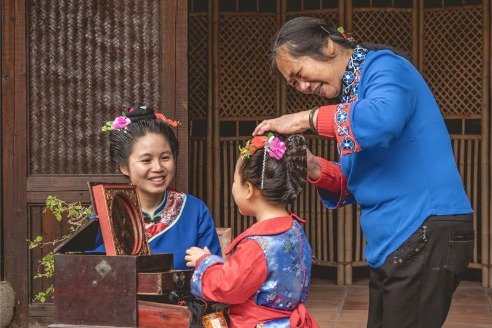Everything coming up roses for farmers struggling in Sichuan

Visitors to Maoshui village in Sichuan province are greeted by fields of roses stretching 268 hectares in every direction.
"Roses are the symbol of romance to many, but my affair with roses was accidental," said village head Chen Wanghui, 44.
"Planting roses is simply a way to lift locals out of poverty."
Maoshui, in the Aba Tibetan and Qiang autonomous prefecture, is home to fewer than 500 people.
In May 2011, residents began complaining to Chen nearly every day about wild boars destroying their crops.
Villagers launched a boar-hunting campaign, but Chen noticed an interesting thing about the ravaged fields - two roses were left standing, unmolested by the marauding animals.
"Boars don't dare to touch thorny roses," she said. "So it occurred to me, why not plant roses which might yield better economic returns?"
To introduce roses to the village, Chen visited the provinces of Gansu, Henan, Shandong, Shaanxi, Hubei and Guizhou to buy seedlings. She planted the seedlings in 2012, and the roses bloomed the next year.
Yang Fajun, Party secretary of Dawei town, which administers Maoshui, said: "Our alpine climate is suitable for growing roses. They blossom for three to four months on the mountain slopes but for only 20 days on the plains."
For this reason, Yang added, the yield per mu - a Chinese measurement equal to 0.067 hectares - from the mountain slopes is three times that of the flatlands.
Chen took her roses to the tea market in Chengdu, the Sichuan capital. Tea dealers told her they were the best roses they had ever seen and promised to buy as may as she had.
To verify what the dealers said, Chen visited the Shandong Pingyin Rose Research Institute in Jinan, capital of Shandong province. Researchers there said her flowers were better than ordinary roses in terms of oil content, aroma and purity.
Thanks to the recognition of both dealers and researchers, Chen gained confidence and set up a cooperative. She encouraged villagers to plant roses and sell them to the cooperative.
"Almost all the residents of Maoshui are ethnic Tibetan and know little about roses," Yang said.
Yang added that Chen gave away the rose seedlings free of charge and paid for the roses they took to her cooperative.
He said villagers earned between 500 and 600 yuan ($75 and $90) per mu by growing potatoes and peas, but can now make as much as 5,000 yuan, as 1 mu yields about 2,750 kilograms of roses.
As all the village's inhabitants have bid farewell to poverty since they began planting roses, people from other villages have been following suit.
Yang said 1,107 households in 13 surrounding villages have joined Chen's cooperative, while 70 percent of more than 200 families have pulled themselves out of poverty thanks to the planting of roses.
- All-aboard! 11-Day tourist train circles Qinghai, Gansu, Xizang
- 149,000 cases filed this year in anti-graft campaign
- Nepali resident marks milestone as 10,000th Letse Port passenger
- China expresses concerns over expansion of Australia-UK-US pact in Asia-Pacific
- Chongqing celebrates World Book Day with subway book machines
- China unveils International Lunar Research Station details





































